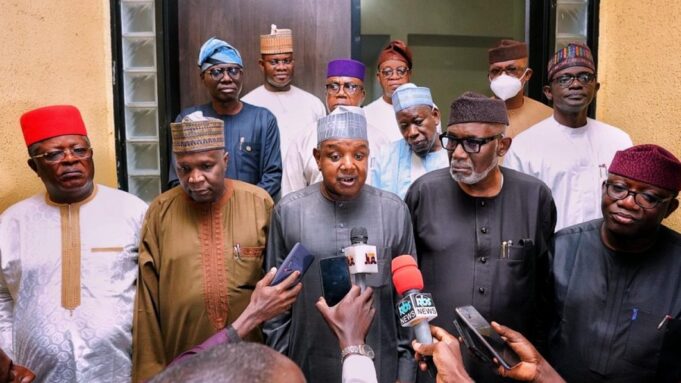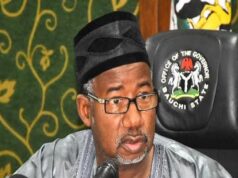By EHICHIOYA EZOMON
Politicians’ think always about the next election, and how to stay in power. It’s never about the people they pretend to represent their interests. Rather, it’s all about their self interests.
Nothing demonstrates this notion of “self” better than politicians’ scramble for the crucial and critical 2023 general election that’s barely 14 months away, going by the timetable drawn by the Independent National Electoral Commission (INEC).
In their bid to hijack the processes of the election, governors of the rival All Progressives Congress (APC) and Peoples Democratic Party (PDP) have surprisingly come together to kick against direct primaries in the Electoral Act Amendment Bill 2021.
The National Assembly (NASS) has voted for direct primaries that will avail the participation of all members of political parties in the selection of candidates for a general or a stand-alone election.
But the governors were opposed to, and mobilized against direct primaries for indirect primaries that enable them to wield enormous power over selection of candidates for any elective positions.
Actually, a team of governors of the ruling APC had met with President Muhammadu Buhari at the Villa in Abuja, to intimate him of the position of majority of their colleagues on direct primaries.
Similarly, the opposition PDP, conveying the objection of the governors on its platform, had stopped short of telling the NASS members, including its representatives, that they went beyond their briefs in inserting direct primaries in the amended Electoral Bill.
As President Muhammadu Buhari suddenly turned the beautiful bride, the NASS leadership also visited the president, according to Senate President Ahmad Lawan, to implore Buhari to shun those (governors) lobbying him not the assent the Electoral Bill.
If Senator Lawan’s courtesy to Buhari wasn’t lobbying in disguise, Speaker Femi Gbajabiamila was explicit in telling the president that direct primaries would deepen democracy in Nigeria, and ensure full integration of the youth in the political process.
Gbajabiamila’s plea ought to strike a cord in Buhari, who claims credit for the passage of the “Not Too Young To Run” Bill that’s supposed to open the political space for Nigerian youths.
It’s uncertain how Buhari’s mind was made up, after weighing the preferences of the governors, the legislators and inputs of various stakeholders, including the INEC, to reportedly decline to sign the Electoral Bill, and return it to the NASS.
Yet, the princely N500 billion, allegedly needed by INEC to conduct direct primaries in the states towards the 2023 polls, would’ve been too much for a cash-strapped president to contemplate.
The Buhari administration, hard-hit by financial crunch, and has resorted to a borrowing spree to execute most of its programmes, can’t afford to add the conduct of primaries to its responsibilities.
The obligation to conduct primaries – direct or indirect – is the sole purview of the political parties, and that appears what the governors are transmitting cloaked in preservation of their self interests.
The questions are: Will NASS members re-amend the returned Electoral Bill, due to the cost implication of conducting primaries for the political parties, and leave funding to the parties?
Or will the legislators summon the courage to “override” the president’s presumed “veto” even if Buhari didn’t entirely withhold his assent to the Bill, but merely referred it to the NASS for further action on the aspect of funding of party primaries?
The fresh review of the Electoral Bill is ongoing, starting with the Appropriation Committee of the House of Representatives’ invitation to the Chairman of INEC, Prof. Mahmood Yakubu, to brief members on the commission’s involvement in the conduct of primaries.
As Rep. Mukhtar Batera (APC-Borno) related to newsmen in Abuja on December 9, Prof. Yakubu told the committee that INEC has a minimal role to play in party primaries, certainly not in the funding, as erroneously or mischievously conveyed to the presidency.
Quoting Yakubu, Rep. Batera, who chairs the House Appropriation Committee, said that INEC isn’t interested in evaluating the cost of primary election(s) because it’s not part of its functions.
“In our discussions with the INEC Chairman, we wanted to know the requirements for the 2023 elections, as well as cost of direct or indirect party primaries,” Batera said.
“On party primaries, he specifically told us the role of INEC in direct or indirect primaries, which he said is just minimal. He said the responsibility… is the role of political parties and not INEC.
“For direct primaries, what the INEC Chairman told us is that only the political parties have the responsibility on primaries and the funding of the primaries.”
The die is cast, and the ball, once again, is in the legislature’s court, to either go ahead and “impose” direct primaries on the unwilling governors, or allow the status quo, which’s a choice among three options: consensus, indirect or direct primaries written into the constitutions of at least the ruling APC and opposition PDP.
But whatever method is adopted, the governors have the wherewithal to prosecute it, sparing no thought in deploying the vast recourses of state to steamroll the process, and include or exclude whoever they fancy, to advance their self interests.
The fear of exclusion – total or partial – from the mainstream politics in the states reportedly galvanised the bitterly-divided NASS along party lines, to close rank and adopt direct primaries for parties.
Going by their reasoning, the adoption of direct primaries would whittle down the influence and power of the governors in the choice of candidates for any elective positions.
The legislators had banked on Buhari’s backing, to seal the dominant political fate of the governors, by helping them to get the Electoral Bill across the finish line. But that seems unlikely with the president’s return of the Bill, with the implications as follows:
* President Buhari has created a record for declining assent to the Electoral Bill for the fifth time, at some occasions on the minute excuse of clerical errors in the piece of legislation.
* Given a choice between the NASS that stands by him almost 100 per cent of the time, and the governors that give him and his government headaches, Buhari has cast his lot with the latter.
* Thus, the president, on the altar of politics, has sacrificed for the governors very dependable allies in the NASS, who, on account of their amenability to Buhari and his administration, are derisively nicknamed by critics as “rubber-stamp” legislators.
* The governors have been emboldened to deploy any means possible, to unilaterally determine the course of politics in their states, even to the exclusion of real or imaginary opponents, many of them members of the NASS and State Houses of Assembly.
* With the power to choose whom they like in their hands, the 2023 polls are a fait accompli for the governors, some of them aspiring to be president/vice president of Nigeria.
* Buhari, who earned his second-term ticket in 2019 via direct primaries, has failed to extend his mantra of free, fair and credible elections to the very foundation for popular choice of candidates.
Going forward, it’s the self-interests of politicians, President Buhari not exempted, that’ve ensured the “death” of direct primaries for the selection of candidates for elections in Nigeria.
Mr. Ezomon, Journalist, writes from Lagos, Nigeria.
- Tony Elumelu Foundation opens 2025 entrepreneurship applications - January 6, 2025
- EFCC sacks 27 officers for fraudulent activities, misconduct - January 6, 2025
- 2024: Nigerians spend N11.5bn to watch Nollywood films in cinema - January 4, 2025










